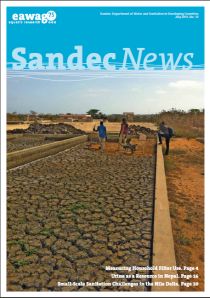
Published in: 2011
Publisher:
Swiss Federal Institute of Aquatic Science and Technology (Eawag), Dübendorf, Switzerland
Author:
Peter, S., Zurbrügg, C. (eds.)
Uploaded by:
SuSanA secretariat
Partner profile:
common upload
5051 Views
22 Downloads
Content - Summary
Among others the journal contains information about:
Urine as a resource in Nepal
Depleting fertiliser supplies call for alternative nutrient sources. Promising low-cost technologies to recover nutrients from urine were therefore field-tested in Nepal. Bastian Etter, Elizabeth Tilley, Kai M. Udert
++++++++
Small-scale sanitation challenges in the Nile Delta
ESRISS – Egyptian-Swiss Research for Innovation in Sustainable Sanitation is a new SECO-funded research project at Sandec. It deals with the sanitation planning gap of Nile Delta villages facing challenges that are more organisational and institutional than technical. The five-year research project, in partnership with the Egyptian Holding Company for Water and Wastewater (HCWW), aims to connect local competence and experience in developing, implementing and monitoring an innovative decentralised sanitation system as a complement to the established centralised systems.
Philippe Reymond, Christoph Lüthi, Rifaat Abdel Wahaab, Moustafa Moussa
Content with regards to sanitation:
Capacity strengthening in sanitation – Benefits of a research – Operator
collaboration
The National Utility of Water and Sanitation (ONEA) in Burkina Faso and the Department of Water and Sanitation in Developing Countries (Sandec) of the Swiss Federal Institute of Aquatic Science and Technology (Eawag) have struck a three-year collaboration to provide sustainable solutions and skills in the sanitation sector. The developed global approach evaluates existing infrastructure, identifies and fills gaps in operational capacity, local knowledge and institutional procedures for wastewater and faecal sludge management.
Magalie Bassan, Mbaye Mbéguéré, Linda Strande-Gaulke
++++++++
Planted drying beds for faecal sludge treatment: Lessons learned through
scaling up in Dakar, Senegal
Experiments have revealed that planted drying beds are a promising technology for faecal sludge treatment in tropical climates. However, most of the current knowledge has been developed through lab-scale experiments. Full-scale planted drying beds have been in operation since 2008 at the Cambérène treatment facility in Dakar, Senegal. Monitoring and evaluation have resulted in important conclusions for scaling up and managing the critical start-up phase of this eco-technology.
Pierre-Henri Dodane, Mbaye Mbéguéré, Ives M. Kengne, Linda Strande-Gaulke
++++++++
Presenting the community-led urban environmental sanitation guidelines
After worldwide piloting and evaluation of the Household-Centred Environmental Sanitation approach, Eawag/Sandec, the Collaborative Council (WSSCC) and UN-HABITAT have published new guidelines for
Community-Led Urban Environmental Sanitation (CLUES).
Christoph Lüthi, Lukas Ulrich
++++++++
Providing sanitation solutions through value chain management
A newly launched project in Sub-Saharan Africa will transpose faecal sludge from waste to a valuable product.
Stefan Diener, Mbaye Mbéguéré, Linda Strande-Gaulke
Bibliographic information
Peter, S., Zurbrügg, C. (eds.) (2011). Sandec News 2011 - July 2011, Vol. 12. Swiss Federal Institute of Aquatic Science and Technology (Eawag), Dübendorf, Switzerland
Filter tags
East Asia & Pacific English Faecal sludge treatment processes Sub-Saharan Africa Urine















